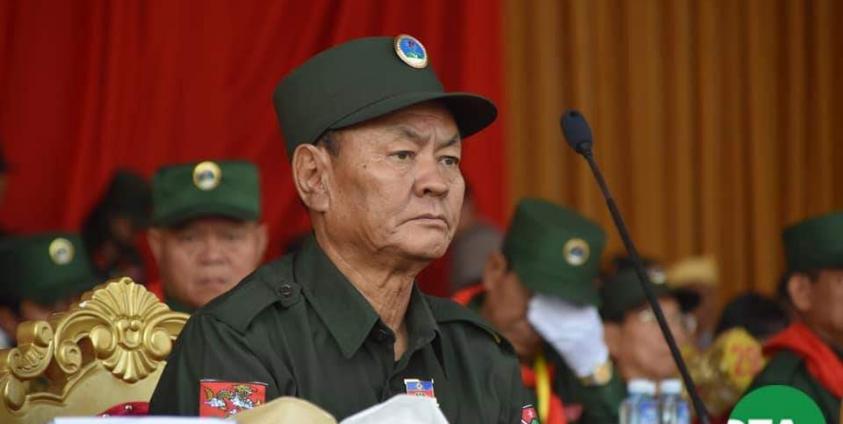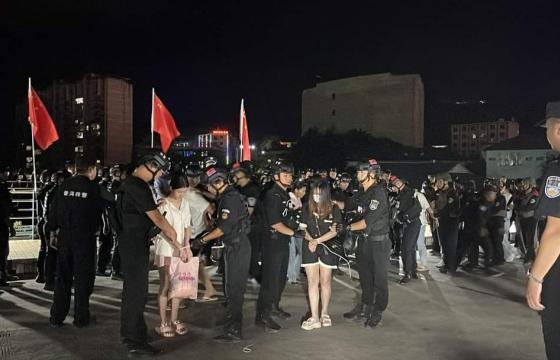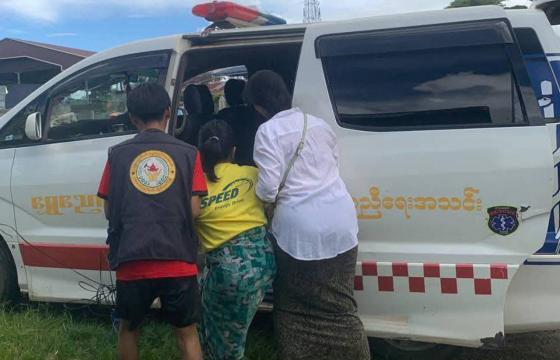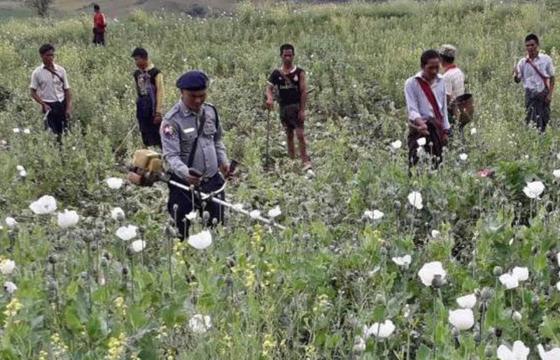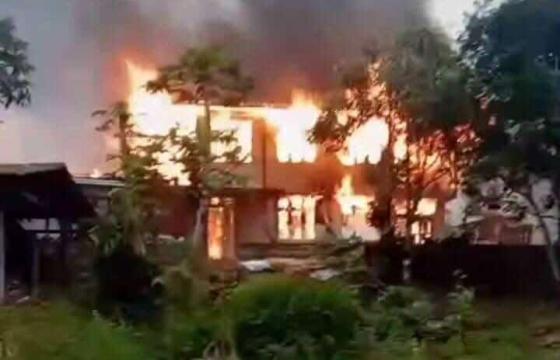As expected the state counselor Aung San Suu Kyi and commander-in-chief Min Aung Hlaing were not present at the United Wa State Army/Party (UWSA/UWSP) 30th anniversary marking the ceasefire with the government, instead a union minister together with the government’s Peace Commission (PC) with a Tatmadaw low-level officer were sent. The foreign diplomatic crops and international NGOs were also not there partly for it is off-limit and also as the government is against any gesture that will look like lending official recognition to the upgrade demand of Wa self-administrative division to “Wa state” which is aimed at being accorded with a national state-level administration status.
On April 16, union minister for labor, immigration and population, Thein Swe , PC vice-chairman Thein Zaw, Zaw Htay, Moe Zaw Oo, and Shan state border security minister colonel Hla Oo flew in with helicopter to attend the 30th anniversary occasion. They were met by UWSA chairman Bao Youxiang, vice-president Xiao Minliang and other Wa leaders.
Earlier, Bao Youxiang, on April 15 said in his speech that the Wa deserved to become a state within the union, carving it out from the present Shan state which it is now officially a part.
He said: “ Wa state is part of the Union of Myanmar and we have profoundly and seriously promised not to secede and won’t ask for independence. Our needs are identity dignity, equality, and ethnic rights of self-determination. We demand Wa state for the Wa people from the union government.”
He expressively stressed: “ In order to achieve this aspiration we will strive for it our whole lives.”
The UWSA has in the past stated quite comprehensively regarding this matter.
In its position paper tabled in September 2016 at the 21st Century Panglong Conference UWSA also revealed some of its thinking, regarding this Wa state upgrade demand issue. The paper said that the present establishment of administrative region procedure gives more rights to the larger ethnic population and could even decide the fate of the lesser minority groups, which is not in line with the notion of national equality. Thus it suggested that if an ethnic group is 100,000 living in the same region, it could apply for autonomous region; if 200,000 autonomous prefecture/district; and if 300,000 a national-level state.
These political positions were again spelled out in Federal Political Negotiation and Consultative Committee (FPNCC) position paper, which in effect cater to the confederacy solution rather than just federalism.
The UWSA headed the FPNCC together with the Kachin independence Army (KIA). Other members are: Myanmar National Democratic Alliance Army (MNDAA) or Kokang, National Democratic Alliance Army (NDAA) or Mong La, Ta’ang National Liberation Army (TNLA), and Shan State Progress Party (SSPP).
Than Soe Naing, the ex-Communist Party Burma (CPB) turned political analyst who is the former comrade of the Was said in an interview with The Irrawaddy that they were very disappointed for the low-level representation sent by the Naypyitaw, as they were preparing and hoping to show their achievement to the state counselor and thought of opening a conversation on how to officially achieve their Wa national state aspirations.
Maung Maung Soe, another ex-CPB and political analyst said a medium-level UWSA functionary told him that he wanted a tripartite meeting of Aung San Suu Kyi, Min Aung Hlaing and his leader Bao Youxiang so that the problem could be resolved peacefully.
The Wa troops within the CPB mutinied in April 1989 and formed the UWSA. The CPB never recovered from it and ceased to exist as a fighting force thereafter.
Meanwhile, Aung San Suu Kyi sent goodwill letter dated April 17 to the 30th anniversary ceasefire occasion emphasizing the mutual respect that has enable the Wa area to prosper. However, she stressed the importance of achieving long term durable peace for the whole country and that the UWSA needs to sign the Nationwide Ceasefire Agreement (NCA). She said the NCA is just a door to pass in building a federal democratic union and all remaining issues that are not covered by the NCA could also be discussed.
AA leader Tun Myat Naing who was attending the occasion in Pangkham, the Wa capital, on April 16 told Frontier Myanmar and the BBC that if all the other ethnic nationalities are given the opportunity to manage their own territories like the way the Was are now enjoying they would also love the union, like the Was do. But the reality is that they are being robbed of their rights of self-determination and also their natural resources. Thus, there is no love for the so-called union so far as the other ethnic nationalities are concerned, he said.
Given such circumstances, the Wa leadership might be disappointed as Naypyitaw has given somewhat like a cold shoulder to its invitation of the government top leaders. But it could also be a blessing in disguise as its confederacy demand is gaining currency among the EAOs and might help restructure the ongoing but stagnated peace process with a new impetus.
In a positive sense the powers that be in Naypyitaw could rethink, become flexible and more agreeable to the demand of ethnicity and equality based federalism and make the negotiation process more achievable, as bargaining for just token federalism, which the ethnic nationalities suspected the government to harbor, with just minimum devolution isn’t going to work. But the negative side could also be the rest of the EAOs will start an armament race taking cue from the UWSA that by building a strong army they can achieve a high degree of confederacy through belligerency.
It now rest on the civilian-military hybrid regime on how it would like to go about and diffuse this burning ethnonationalism aspirations in a peaceful way.


